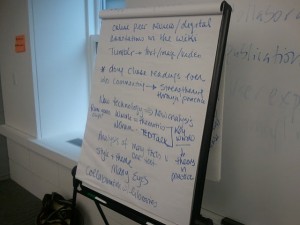The final session I attended at ThatCamp Philadelphia was run bu Janine Utell on integrating the digital humanities into regular literature classrooms.
- Amanda French defines the digital humanities as “open access”
- How can student work be put online? WordPress, PBWorks, etc
- Digital Humanities Quarterly given as example of open access
- Should give students option to take down work at the end of the semester
- I am going to try out commonplace blogs with my eng102 classes next semester
- Utell: Digital humanities is essential to keeping the humanities alive
- Some discussion about establishing comment policies
- Crowd sourcing comment policy to students
- Peer review is important before work goes online
- Instructor comments on blogs tapers off as semester goes on
- French and Siobhan Phillips bring out Google’s ngrams, wordles
- I’ve had students A/B an Obama speech to a Jefferson speech
- More incorportation of audio, video, etc into literary classes
- Modernist Journals Project
- Amanda French stresses the need to teach bibliographic software like Noodle, Evernote, and Zotero
